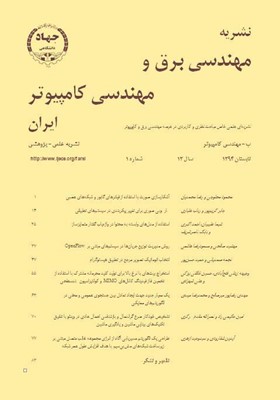طراحی یک الگوریتم مسیریابی آگاه از انرژی مجموعه غالب متصل مبتنی بر زیرساخت شبکههای مش بیسیم با هدف افزایش طول عمر شبکه
محورهای موضوعی : مهندسی برق و کامپیوترآیدین شفارودی 1 , سیدوحید ازهری 2
1 - دانشگاه علم و صنعت ایران
2 - دانشگاه علم و صنعت ایران
کلید واژه: شبکه مش بیسیم طول عمر شبکه مجموعه غالب متصل مسیریابی آگاه از انرژی,
چکیده مقاله :
شبكه مش بيسيم، شبكهای چندجهشه متشکل از مسيريابها و كاربران مش میباشد که امكان يكپارچه كردن شبكههاي بیسيم موجود، جهت ارائه سرويس با ويژگيهاي متنوعتر و بهتر را فراهم ميآورد. مسیریابها به صورت خودکار به برقراري ارتباط بیسیم بین یکدیگر میپردازند، بنابراین در بسیاري موارد نیاز به اعمال مدیریت و صرف هزینه هنگفت براي راهاندازي شبکه وجود ندارد. از طرفی این گونه از شبکهها دارای قابلیت متصلکردن شبکههای ناهمگون به هم هستند و میتوانند از استانداردهای متنوعی پشتیبانی کنند. در مواردی که مسیریابهای زیرساخت شبکه مش به انرژی برق شهری دسترسی نداشته باشند، استفاده از شبکه مش بیسیمی که با باتری و انرژی خورشیدی کار میکند، بسیار مفید خواهد بود. در این حالت اساسیترین مشکل، اتمام سریع شارژ باتریها و قطع شبکه است و لذا در این مقاله راهکاری برای افزایش طول عمر شبکه و استفاده بهینه از انرژی باتری گرهها پیشنهاد شده که میتواند مدت زمان کارکرد شبکه را بسیار بالا ببرد. الگوریتم مسیریابی پیشنهادی، گرههایی در شبکه را با بیشترین انرژی باقیمانده مشخص کرده و دادهها فقط از میان گرههای تعیینشده عبور میکنند تا زمانی که انرژی یک گره به سطح آستانه از پیش مشخص شده نزدیک شود. نتایج شبیهسازی نشان میدهد که این روش کارایی بهتری نسبت به شیوههای متداول مسیریابی و ارسال اطلاعات در این نوع شبکهها دارد.
In many applications, wireless mesh networks work by battery as a power source. In this scenario, routing method has a great impact on the network lifetime. In this research a new backbone based wireless mesh network routing method for maximizing lifetime has been proposed. This approach is compatible with the features provided by IEEE standard for wireless mesh networks. In this method, backbone routers are selected based on the maximum remaining energy. The proposed algorithm is compared with optimum and shortest path routing methods. Simulation results show acceptable increase in network lifetime in the proposed approach.
[1] G. Aggelou, Wireless Mesh Networking, McGrow-Hill Ltd, 2009.
[2] T. D. Todd, A. A. Sayegh, M. N. Smadi, and D. Zhao, "The need for access point power saving in solar powered WLAN mesh network," IEEE Network, vol. 22, no. 3, pp. 4-10, May/Jun. 2008.
[3] P. Kaushik and J. Singhai, "Energe - efficient routing algorithm for maximizing the minimum lifetime of wireless sensor network: a review," Int. J. of Adhoc, Sensor & Ubiquitous Computing, IJASUC, vol. 2, no. 2, pp. 25-36, Jun. 2011.
[4] D. M. Shrestha and Y. B. Ko, "On construction of the virtual backbone in wireless mesh networks," in Proc. of the 8th Int.l Conf. Advanced Communication Technology, ICACT, vol. 1, 6 pp., 20-22 Feb. 2006.
[5] J. Chang and L. Tassiulas, "Energy conserving routing in wireless ad - hoc networks," in Proc. of IEEE INFOCOM, vol. 1, pp. 22-31, 2000.
[6] J. Wieselthier, D. Nguyen, and A. Ephremides, "Energy - aware wireless networking withdirectional antennas: the case of session - based broadcasting and multicasting," IEEE Trans. on Mobile Computing, vol. 1, no. 3, pp. 176-191, Jul.-Sep. 2002.
[7] R. Asgarnezhad and J. A. Torkestani, "A survey on backbone formation algorithms for wireless sensor networks: (a new classification)," in Proc. Australasian Telecommunication Networks and Applications Conf., ATNAC4 pp., 9-11 Nov. 2011.
[8] I. Joe, "A path selection algorithm with energy efficiency for wireless sensor networks," in Proc. 5th ACIS Int. Conf. on Software Engineering Research, Management, & Applications, SERA'07, pp. 419-423, 20-22 Aug. 2007.
[9] C. Ma, Y. Yang, and Z. Zhang, "Constructing battery - aware virtual backbones in sensor networks," in Proc. Int. Conf. on Parallel Processing, ICPP, pp. 203-210, 14-17 Jun. 2005.
[10] J. Wu, M. Gao, and I. Stojmenovic, "On calculating power - aware connected dominating sets for efficient routing in ad hoc wireless networks," in Proc. Int. Conf. on Parallel Processing, . pp. 346-354, 3-7 Sep. 2001.
[11] Y. Zhang and J. Luo, Wireless Mesh Networking: Architectures, Protocols and Standards, Boca Raton, FL: Auerbach Publications, 2007.


